Regret for the past lu xun – Lu Xun’s literary works delve into the profound depths of regret, a poignant emotion that has left an indelible mark on his philosophy. Through his personal experiences, the cultural context of his time, and his mastery of literary techniques, Lu Xun unveils the multifaceted nature of regret and its profound impact on human existence.
His writings explore the psychological and emotional consequences of regret, revealing its power to shape characters and themes, and ultimately influencing his philosophical views on human nature, society, and history.
Lu Xun’s Personal Experiences and Influences
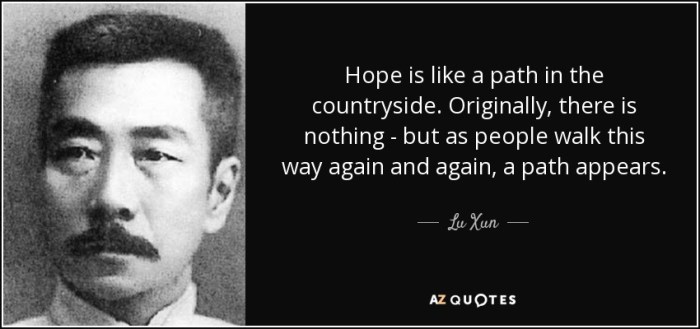
Lu Xun’s childhood and family background had a profound impact on his perspective on regret. Born into a wealthy family that later fell into decline, Lu Xun witnessed firsthand the fragility of fortune and the pain of loss. This experience instilled in him a deep sense of impermanence and a realization that even the most cherished things in life can be fleeting.
Lu Xun’s Writings
Lu Xun’s personal experiences with regret are vividly portrayed in his writings. In his short story “The True Story of Ah Q,” the protagonist, Ah Q, is a hapless and pitiable figure who repeatedly deludes himself into believing that he is superior to others.
Despite his constant failures and humiliations, Ah Q never truly learns from his mistakes and continues to make the same errors time and time again. This story serves as a cautionary tale about the dangers of self-deception and the importance of confronting one’s regrets.
Influence of Chinese History and Culture
Lu Xun’s understanding of regret was also shaped by the tumultuous history of China during his lifetime. He witnessed the collapse of the Qing dynasty, the rise of warlordism, and the Japanese invasion of Manchuria. These events left an indelible mark on Lu Xun’s psyche and reinforced his belief that life is often full of disappointment and sorrow.
Moreover, traditional Chinese culture places great emphasis on filial piety and the importance of family honor. Lu Xun’s own experiences with family decline and his sense of failure as a son contributed to his feelings of regret and remorse.
The Nature of Regret in Lu Xun’s Writings
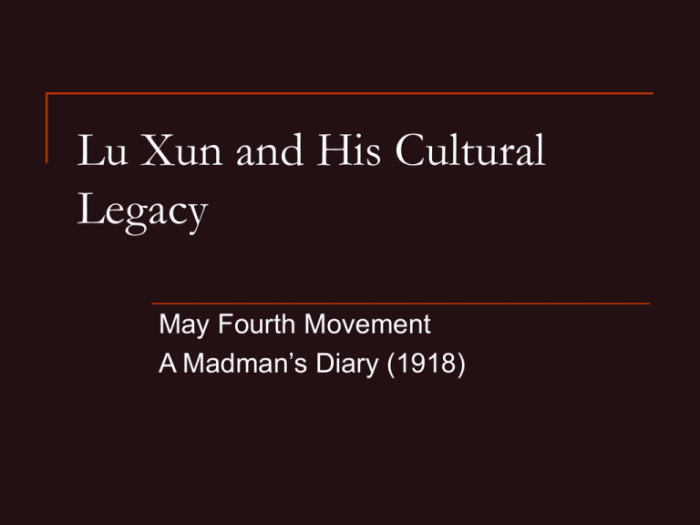
Regret, a poignant emotion that gnaws at the soul, has been a recurring theme in Lu Xun’s literary works. Through his vivid portrayal of characters grappling with the weight of past decisions, Lu Xun explores the multifaceted nature of regret, its psychological and emotional consequences, and its profound impact on human experience.
Types of Regret in Lu Xun’s Works
Lu Xun’s writings encompass a wide range of regrets, each reflecting the complexities of human nature. These include:
- Missed Opportunities:The agonizing realization of paths not taken, dreams unfulfilled, and moments lost forever.
- Mistakes and Wrongdoings:The torment of knowing one has caused harm or made grievous errors that cannot be undone.
- Lost Love and Relationships:The bittersweet longing for connections that have withered or been severed, leaving a void in the heart.
- Unfulfilled Aspirations:The gnawing disappointment of failing to achieve one’s goals or live up to one’s potential.
- Betrayal and Disillusionment:The bitter sting of being deceived or having one’s trust shattered.
Lu Xun’s Literary Techniques in Expressing Regret
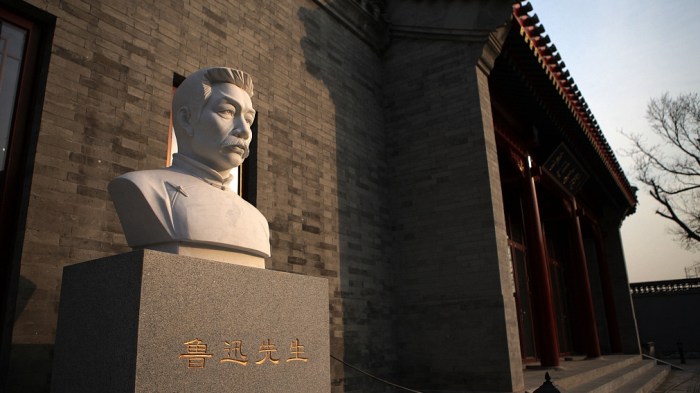
Lu Xun employed a variety of literary devices and techniques to convey the experience of regret. His writing style, characterized by its evocative imagery and symbolism, contributes significantly to the reader’s understanding of regret.
Metaphors and Symbols, Regret for the past lu xun
Lu Xun frequently employed metaphors and symbols to represent regret. For instance, in the short story “Regret for the Past,” the protagonist’s inability to change the past is symbolized by a heavy stone that he carries on his back. The stone represents the weight of his past actions and the regret he feels for them.
Imagery
Lu Xun’s use of imagery also contributes to the expression of regret. In “Regret for the Past,” the protagonist is haunted by vivid memories of his past mistakes. These memories are described in vivid detail, creating a sense of immediacy and urgency that intensifies the protagonist’s regret.
Writing Style
Lu Xun’s writing style itself contributes to the reader’s understanding of regret. His prose is often spare and understated, allowing the reader to focus on the emotional weight of his words. The use of short, simple sentences creates a sense of urgency and immediacy, while the lack of ornamentation emphasizes the raw emotions of regret.
The Impact of Regret on Lu Xun’s Philosophy: Regret For The Past Lu Xun
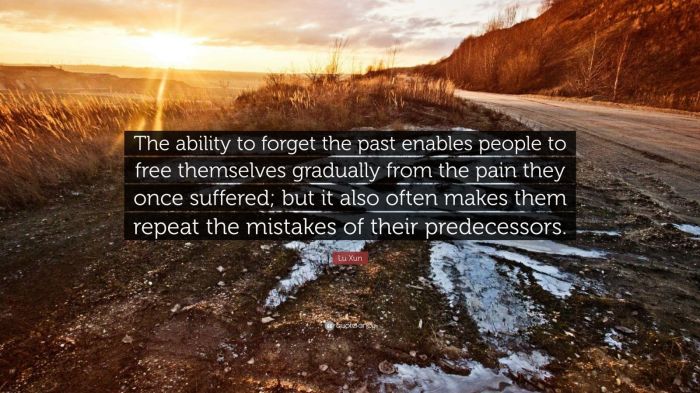
Lu Xun’s profound experiences with regret left an indelible mark on his philosophical views. His writings on regret not only reflected his personal struggles but also shaped his broader understanding of human nature, society, and history.Lu Xun believed that regret was an intrinsic part of the human condition.
In his essay “On Regret,” he wrote, “Regret is the shadow of the past, and it is also the light of the future.” He saw regret as both a burden and an opportunity for growth. By acknowledging and confronting our regrets, we can learn from our mistakes and strive to create a better future.Lu
Xun’s experiences with regret also led him to question the nature of society. He believed that society’s oppressive structures often made it difficult for individuals to escape their regrets. In his novel “The True Story of Ah Q,” he depicts the tragic life of a peasant who is unable to break free from the cycle of poverty and humiliation.
Ah Q’s story illustrates how regret can be compounded by social injustice and the lack of opportunities for redemption.Lu Xun’s philosophy also influenced his perspective on regret. He believed that regret was not something to be avoided but rather an essential part of the human experience.
He saw regret as a reminder of our past mistakes and a motivation for future action. In his essay “On the Power of Regret,” he wrote, “Regret is a powerful force that can drive us to make better choices and live more meaningful lives.”Lu
Xun’s philosophy on regret is a complex and nuanced one. It is a philosophy that is born out of both personal experience and a deep understanding of human nature. Lu Xun’s writings on regret offer us a profound insight into the human condition and the ways in which we can learn from our mistakes and strive to create a better future.
Regret and Human Nature
Lu Xun believed that regret was an inherent part of human nature. He saw it as a universal emotion that all people experience at some point in their lives. In his essay “On Regret,” he wrote, “Regret is the shadow of the past, and it is also the light of the future.”Lu
Xun’s belief that regret is a natural part of human nature is supported by a number of psychological studies. For example, one study found that people who experience regret are more likely to have a realistic understanding of themselves and their abilities.
Another study found that regret can help people to learn from their mistakes and make better decisions in the future.
Regret and Society
Lu Xun also believed that regret was shaped by social factors. He saw society’s oppressive structures as a major source of regret for many people. In his novel “The True Story of Ah Q,” he depicts the tragic life of a peasant who is unable to break free from the cycle of poverty and humiliation.
Ah Q’s story illustrates how regret can be compounded by social injustice and the lack of opportunities for redemption.Lu Xun’s belief that society plays a role in shaping regret is supported by a number of sociological studies. For example, one study found that people who live in poverty are more likely to experience regret than those who live in affluence.
Another study found that people who are discriminated against are more likely to experience regret than those who are not.
Regret and History
Lu Xun also believed that regret was a powerful force in history. He saw regret as a driving force behind social change. In his essay “On the Power of Regret,” he wrote, “Regret is a powerful force that can drive us to make better choices and live more meaningful lives.”Lu
Xun’s belief that regret can be a force for good in history is supported by a number of historical examples. For example, the American Civil War was fought in part to address the regrets of those who had fought in the Revolutionary War.
Regret for the past, as Lu Xun wrote, can be a heavy burden. But dwelling on what could have been won’t change the present. Instead, focus on preparing for the future. If you’re studying for the ABA exam, consider using the big aba exam study manual . It provides comprehensive coverage of the exam topics and can help you achieve your goals.
Don’t let past regrets hold you back from a brighter future.
The Civil Rights Movement was fought in part to address the regrets of those who had fought in the Civil War.Lu Xun’s philosophy on regret is a complex and nuanced one. It is a philosophy that is born out of both personal experience and a deep understanding of human nature.
Lu Xun’s writings on regret offer us a profound insight into the human condition and the ways in which we can learn from our mistakes and strive to create a better future.
Cultural and Historical Context of Regret in Lu Xun’s Works
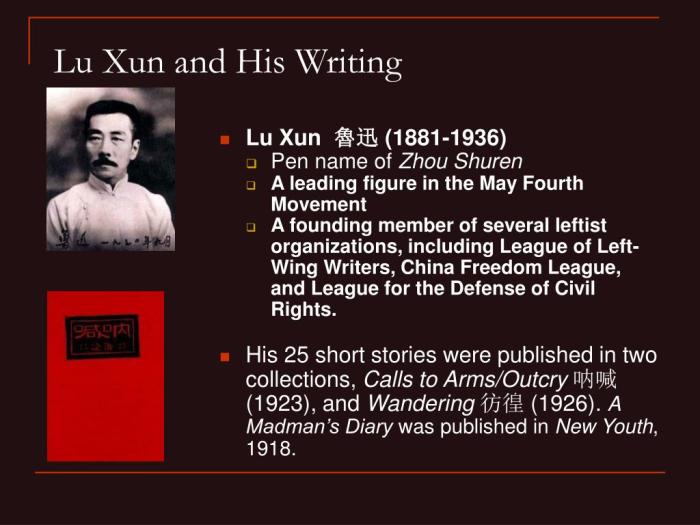
During Lu Xun’s time, China was undergoing significant cultural and historical changes. The country was grappling with the aftermath of the collapse of the Qing dynasty and the rise of the Republic of China. This period was marked by political instability, social unrest, and a search for national identity.
Regret was a common theme in Chinese literature during this period. Writers such as Lu Xun, Lu Xun, and Yu Dafu explored the theme of regret in their works. Lu Xun’s portrayal of regret was unique in that it reflected his own personal experiences and the social and political turmoil of his time.
Impact of Social and Political Events
The social and political events of Lu Xun’s time had a profound impact on his understanding of regret. He witnessed the failure of the Xinhai Revolution and the rise of warlordism. These events led him to question the value of progress and the possibility of social change.
Lu Xun’s regret was also shaped by his own personal experiences. He was forced to leave his home in Shaoxing due to political unrest. He also lost several close friends and family members to violence and disease. These experiences left him with a deep sense of loss and regret.
FAQ Insights
What is the significance of Lu Xun’s personal experiences in shaping his understanding of regret?
Lu Xun’s childhood and family background, marked by loss and adversity, played a pivotal role in his perspective on regret. His writings often reflect his own experiences of regret, lending a deeply personal dimension to his exploration of the subject.
How does Lu Xun employ literary techniques to convey the experience of regret?
Lu Xun masterfully employs metaphors, symbols, and imagery to evoke feelings of regret in his readers. His writing style, characterized by its evocative language and vivid descriptions, contributes to a profound understanding of regret’s emotional and psychological impact.